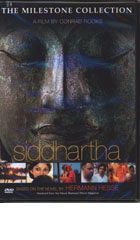
Siddhartha 2002 (re-release of 1972 film)
Distributed by Milestone Films & Video, PO Box 128, Harrington Park, NJ 07640-0128; 800-603-1104
Produced by Conrad Rooks
Directed by Conrad Rooks
DVD, color, 83 min.
Sr. High - Adult
Religious Studies, Asian Studies, Literature
Date Entered: 11/09/2018
Reviewed by Faye Chadwell, University of Oregon Library System, Eugene, ORConrad Rooks’ Siddhartha is the film adaptation of Herman Hesse’s Nobel Prize winning novel Siddhartha. Milestones’ 2002 re-release of Rooks’ 1972 film on DVD was just in time to celebrate the 125th anniversary of Hesse’s birth.
Unavailable in North America in any format since 1985, Siddhartha was originally shot by legendary Swedish cinematographer Sven Nykvist on location in Northern India. Nykvist offers some beautiful landscapes featuring the holy city of Rishikesh and the private estates of His Highness the Maharajah of Bharatpur. An Indian music score composed and sung by Hemant Kuma accompanies Nykvist’s camerawork. Unfortunately the film never loses the look and feel of a 1970s piece.
Hesse’s novel is among the most successful attempts by a Western author to illustrate Indian philosophy. Rooks’ boldly made Siddhartha with only one other film to his credit - Chappaqua. Made in 1966, Chappaqua was an experimental and autobiographical film documenting Rooks’ withdrawal from years of drug and alcohol addiction. After Siddhartha, Rooks never made another film, which speaks volumes about this film’s lack of appeal to most contemporary audiences.
Though Rooks’ interpretation is a weak interpretation of an interpretation, to his credit, the film is quite faithful to the original novel. The cult-like popularity of Hesse’s Siddhartha and its enduring status on the required reading list for many college courses dictate that many are already familiar with the storyline. Born into wealth, Siddhartha, a young Brahmin, leaves behind his parents to become a sadhu or wandering ascetic. Shashi Kapoor, legendary Indian actor and star of three James Ivory films, plays the lead role. Accompanied by his friend Govinda (Romesh Sharma) Siddhartha soon encounters the Buddha. Unlike Govinda, he does not take the Buddhist path, but seeks his own way. His search leads him back to material wealth and to sexual passion with Kamala (Simi Garewal). Simi Garewal is herself legendary because in this film she became the first Indian woman to appear in a nude scene.
When the couple’s passions and material wealth fail to satisfy Siddhartha, he abandons Kamala to become the apprentice of the poor ferryman, Vasudeva (Zul Vellani). Several years later, when the Buddha is approaching death, many attempt to reach him via the ferry including Kamala. Unfortunately Kamala succumbs to a snake bite leaving behind her son, also Siddhartha’s child, in the care of his father. Despite his father’s doting, the younger Siddhartha cares nothing for his father’s simple lifestyle on the river and flees. Though this loss deeply saddens the older Siddhartha, Vasudeva helps Siddhartha heal. Eventually, it is this simple ferryman who helps Siddhartha gain the enlightenment he has sought for a lifetime.
Siddhartha is not meant to be an action-packed, adventure film, but viewers will have difficulty connecting with the film’s Siddhartha in the way they might have with the novel’s protagonist. The acting will seem uninspiring. The narrative just barely strolls along, rendering the film flat and uninteresting for many contemporary viewers. Other viewers, at least a few, may enjoy this movie’s quiet, ambling flow especially coupled with the extraordinary cinematography. It is the antithesis of harsh, dramatic films like Requiem for a Dream or noisy, violent flicks like Lethal Weapon.
The DVD medium offers bonus features that were unavailable the first time this film was released, but the offering of soundtracks in English, German, or Spanish; Rooks’ original storyboards and script selections; and an interview with Rooks are not enough to warrant re-releasing this film or to recommend the DVD’s purchase. Siddhartha’s quest is experienced best via its original medium - the book.